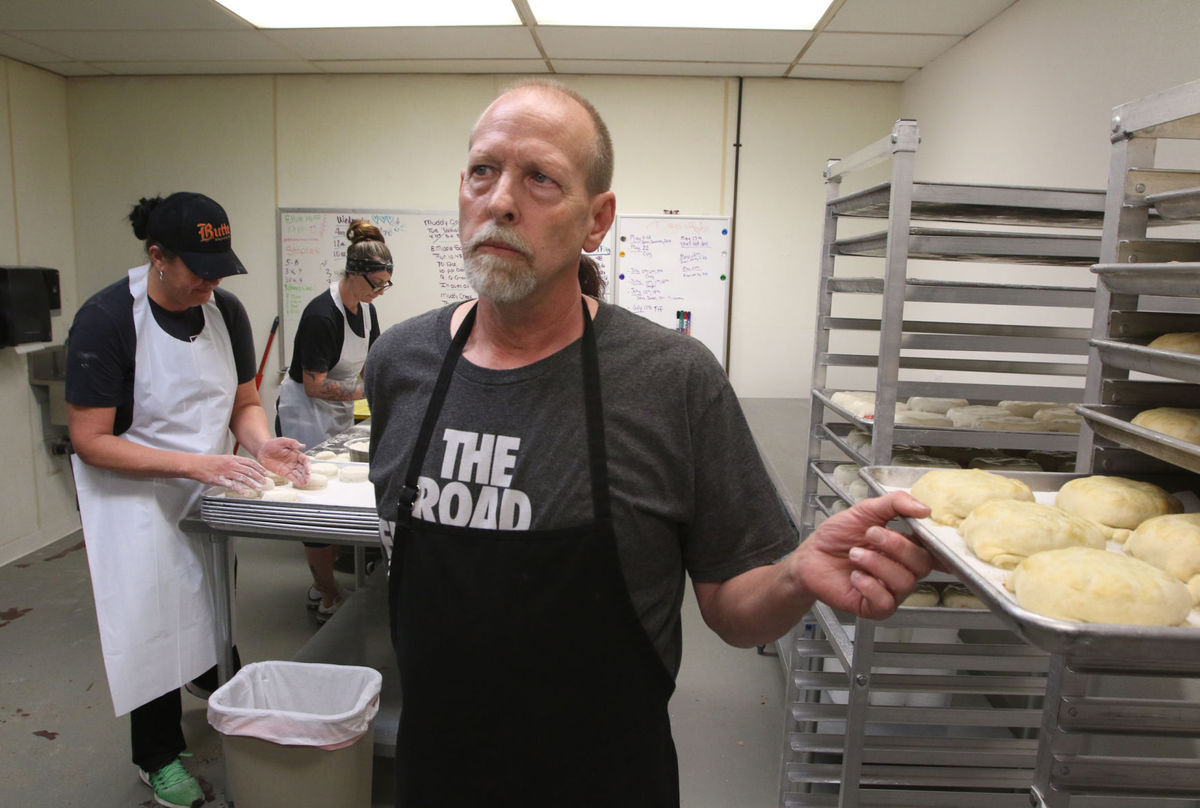Montana Standard: ‘Legg regs’ take their toll on plants throughout Montana

John Truzzolino displays a tray of beef pasties at his shop on Harrison Avenue. Truzzolino says he assumed Food Safety and Inspection Service front-line Supervisor Jeffrey Legg “was being truthful” about needed changes in his warehouse but later found out the changes were not required by federal regulations.
Walter Hinick, The Montana Standard
by DAVID McCUMBER | September 17, 2017
Editor’s note: Last of a two-part series. Sunday’s first installment detailed how Bart Riley, owner of Riley’s Meats, received a long list of required changes to his plant when it was visited by Food Safety and Inspection Service front-line supervisor Jeffrey Legg and what happened after Riley found none of the changes were actually required by federal regulations.
John Truzzolino is the latest in his family to operate a tamale factory in Butte.
His grandfather, Vincent Truzzolino, started his business in 1896, opening a shop on Mercury Street that his family operated in the same spot until 1975.
The family, originally from Sicily, emigrated to New York and from there to Butte — by way of Louisiana, where apparently Vincent Truzzolino learned about tamales. He used an Italian-style, polenta-like corn meal to coat his tamales instead of masa, the Mexican version. And his large-sized tamales were hand-tied.
When the business closed in 1979, John Truzzolino continued to make the delicious tamales for family and friends. One day his daughter asked him a question: “These are so good, why aren’t you selling them?” And that was enough to get the family back in the business.

From left,Savanna and Janel Truzzolino and Tiffany Block produce beef pasties at the Truzzolino Tamales plant and retail outlet located at 1921 Harrison Ave.
Walter Hinick, The Montana Standard
Now, Truzzolino operates in a sparkling shop and factory at 1921 Harrison Ave., making myriad varieties of chicken, beef, pork, and veggie tamales and also several types of pasties (including one made with pork sausage from Riley’s Meats in Butte), all of which are sold in stores over a wide area and also from the shop.
When Food Safety and Inspection Service front-line supervisor Jeffrey Legg came to look at the plant, he immediately gave Truzzolino a list of things that needed to be fixed or changed.
He didn’t like the cutting boards Truzzolino was using. He mandated the use of plastic pallets instead of wood. He said Truzzolino’s warehouse “wasn’t up to standard,” Truzzolino recalls. And he said Truzzolino had to put his pallets in his warehouse and his freezer up on cinder blocks.
“I assumed he was being truthful,” Truzzolino said, “so I bought plastic pallets. He had an inspector write me up for not having the pallets up on blocks” — something that is not in the regulations.
“He was good at that,” Truzzolino said. “He’d walk through and compliment your plant and then send an inspector in to write you up, so his name wasn’t on anything.”
Truzzolino bought cinder blocks and raised his pallets. But it took up lots of extra space, and so he removed them, and on subsequent visits, no inspector — not even Legg himself — has brought it up again.
As for his warehouse and his cutting boards, he says Legg has been back several times over the years and has always been complimentary and has never repeated his initial assertions.
In January 2015, FSIS inspector Robert Espelund threw John Truzzolino a major curve.
He asked Truzzolino to see “my letter of guarantee for the ground beef that I have delivered by Riley’s Meats,” Truzzolino said in a written statement to FSIS. Truzzolino had never been asked for such a letter before, and he didn’t think one was required. When he told Espelund that, the inspector replied that “Dr. Legg said it was,” Truzzolino wrote.
The inspector asked Truzzolino every day that week to get such a letter from Riley. The inspector told him Dr. Legg was coming to the plant next week and Truzzolino needed to have the letter by that time.
Truzzolino went to the FSIS website, which has a feature called “Ask FSIS” to clarify questions on rules and regulations. The agency replied on Jan. 20 that there was no requirement for such a letter of guarantee from a vendor.
When Espelund arrived the next day, he asked again where the letter was, and Truzzolino told him he wasn’t getting one. Legg did not show up the next week, and nothing more was said about a letter of guarantee from Riley.
When Bart Riley found out, he was incensed. He and Truzzolino filed yet another formal complaint against Legg. “This interferes with my right to do business,” Riley wrote, adding that he felt that harassing Truzzolino was an effort to harass him at the same time.
They never received a response — or even an acknowledgement that the complaint was received.
Former FSIS boss weighs in
Dr. Richard Raymond is a former Undersecretary of Agriculture for food safety — a position that directly supervised the Food Safety and Inspection Service.
Raymond, an affable physician from rural Nebraska, has both a quick wit and a disarming sense of humor, and his bedside manner translated well to his job atop a roiling anthill of federal bureaucrats.
He also has a passion for food safety, and even after leaving the agency in 2009, he continued to make an impact, blogging frequently on the meat-industry web site meatingplace.com.
In 2011, he wrote a series of posts about the blizzard of NRs at small plants in Montana, pointing out that these plants, “which have only one inspector for just a few hours each day and share the same Front Line Supervisor, have had many more NRs” than large plants.
He pointed out that Butte’s Ranchland Packing got 158 NRs in 2010. “Writing 158 NRs is not educational, and takes time away from making a safer product,” he wrote. “The actions taken by FSIS inspectors are an embarrassment to FSIS and its inspection system.”
In his blog, he pointed out that former Sen. Max Baucus asked that “one particular FSIS employee’s overzealous actions regarding the writing of NRs be evaluated.”
In response, FSIS told Baucus that “Deputy District Manager Andrew Lorenz recently performed a circuit review of the Billings Circuit … as well as physically reviewing 15 establishments and meeting with inspectors and establishment management.”
John Munsell, a former meat plant owner in Miles City who has become an FSIS gadfly and an activist on behalf of small plant owners, filed a Freedom of Information Act request seeking the dates and locations of Lorenz’s 15-plant review.
After a period of non-responsiveness, the FOIA request was apparently “lost,” the agency told Munsell. Then shortly after Raymond’s first blog on NRs, it was “found,” and the response to Munsell simply said the agency “failed to locate any documents that would be responsive” to Munsell’s request.Raymond was incredulous. “Surely there are travel records, motel and gas receipts, calendar entries, phone call records — something? Anything?” the former undersecretary wrote. “If FSIS cannot find ‘any documents,’ just how did they reach the number 15 conveyed to Sen. Baucus?”
Later, under pressure from Baucus and Montana Gov. Brian Schweitzer, FSIS produced records indicating a lightning-fast “tour” of two days spanning many hundreds of miles and 15 site visits. Several plant managers would dispute that some of the visits actually occurred.
“Basically,” Raymond said in an interview, “FSIS got busted. It was a whitewash.”
One startling thing did come of Raymond’s blogs on the Montana NRs: The citations quit coming.
“The best news is that since those blogs were posted, the plants — which were averaging over 100 NRs per year — now get just a handful. Very few NRs are being written for food-safety issues or facility problems,” Raymond wrote in August 2011.
Plant operators say that the great fluctuation in NRs follows a pattern that has nothing do to with the plants’ safety performance.
“After the (Raymond) blogs, the number of NRs went down. After I filed official complaints, they went down,” Riley says. “When they got heat from senators, they went down.”
Today, Raymond remains mystified at what Legg has done in the circuit — and why he is still in charge of it.
Raymond was the boss who demanded that FSIS staff go to Montana for the “listening sessions” shortly after he took over as undersecretary.
Shortly afterward, he removed Bill Smith as assistant administrator in charge of the Office of Field Operations. “He had an attitude” about the small plants, Raymond recalled in an interview last month. “But now Bill Smith is back as the top dog as head of the Office of Field Operations,” Raymond said. “So why would we expect any change?”
Smith, through FSIS public affairs, declined to comment for this story.
‘Dream crusher’
In Montana, despite the pronouncements by FSIS brass at the listening sessions, “Legg regs” have continued to take their toll — not only on plants currently under inspection but also on operations that wished to become inspected under the federal program.
Rick Toot, who worked for 37 years as a USDA inspector — the last nine under Legg — told FSIS investigators in an affidavit, “I have witnessed Dr. Legg make … visits to two different plants (seeking federal inspection) in southwest Montana in recent years, with the same result. He tells the owners or managers that they have to meet certain requirements that are extremely costly but have no foundation in federal regulation or guidelines. Neither of the plants pursued federal inspection after these visits because of the debilitating costs of the changes Dr. Legg demanded.
“In fact, these visits resulted in Dr. Legg being given the nickname ‘dream crusher.'”
Meat Montana LLC, a small slaughter plant in McAllister, Montana, was interested in applying for federal inspection a few years ago. It was the newest such plant in the state, having been built in 2009 — “of modern, approved materials,” Toot would attest. Toot accompanied Legg on a visit, and the longtime inspector thought the plant looked to be in good shape and, with minor improvements, could quickly qualify for federal inspection.
Legg was having none of it. He told plant owner Dave Germann and his son Garl that “all rails, from the kill floor to coolers, must be made of stainless steel” (or finished in stainless) and “the undersides and bottom platforms of all our tables must be stainless steel,” Garl remembers.
Garl remembers a lengthy list of other criteria, and he and his father figured that the renovation costs would be in the hundreds of thousands of dollars.
Dave Germann contacted Toot a year or so later and said again he was interested in federal inspection. “He asked me if Dr. Legg was still the official he had to go through for approval,” Toot wrote in his affidavit. “When I told him (yes), he said, ‘Forget it, then.'”
As a result, the plant, which employed several local people and did all of its procurement business locally, is now vacant and out of operation.
Toot also told investigators that John Tutsch in Sheridan, who already had a small federally inspected processing plant, wanted to lease an additional slaughter facility in the area that was under state inspection.
Again, Toot toured the plants and thought the conversion of the leased plant to federal inspection would be no big deal. But Legg chimed in with thousands of dollars’ worth of requirements, none of them backed by regulations, and Tutsch decided to take both plants to state inspection instead.
Now, he is no longer in the meat business.
FSIS, during multiple investigations into at least six formal complaints against Legg during his Montana tenure, has repeatedly been informed of the “Legg regs” issue, as affidavits obtained by The Montana Standard under the Freedom of Information Act show. Yet the issue continues.
Just last year, Artisan Charcuterie, a state-inspected Bozeman facility, applied for federal inspection, perceiving an opportunity to greatly expand into markets farther afield. Legg visited the plant.
Legg came up with a very long list of changes he would require. Many of the demands would be familiar to other plant owners. They included fiberglass board walls, new floor treatment, and several rooms that would need to be built, including an office for the inspector.
“During the meeting, we were deciding not to pursue USDA inspection, and were encouraged not to by Jeff Legg,” manager Nic Bryce would say later.
Since then, Artisan Charcuterie has changed its business plan rather than spend the money Legg indicated was necessary to attain federal inspection.
Cartoon ‘threatens’ inspectors
During his initial difficulties with Legg, including the blizzard of NRs he received, Bart Riley put a cartoon up on his wall.
It showed a large bird, like a heron, trying to swallow a frog. The frog, its head already in the bird’s gullet, had its front legs around the bird’s neck. Next to the animals were the words “Never give up.” The frog was labeled “Very Small Montana Meat Processors”, and another caption read “U.S. Gov’t Sanctioned Terrorists.”

“Nobody holds him accountable,” Bart Riley says of the Food Safety and Inspection Service front-line supervisor Jeffrey Legg.
Walter Hinick, The Montana Standard
Inspectors laughed at the poster when they saw it. But Legg, inspectors would say later, thought the cartoon was his best chance yet to get rid of Bart Riley.
On the morning of May 25, 2006, Legg and two subordinates, including the current inspector for Riley’s, came to the shop for a meeting with Bart, who was joined by longtime Montana meat plant proprietor John Munsell of Miles City. Munsell has been a vocal critic of FSIS in Montana and an advocate for small-plant operators.
Legg said, “Bart, we need to talk about the sign on the wall.” He went on to say that he and the two other FSIS staffers felt “physically threatened” by the sign.
Munsell, in recapitulating the meeting, said that he thought Legg expected Bart to say — accurately — that the sign was protected free speech, and it was his First Amendment right to post it.
Legg cited “agency policy concerning intimidation, interference, threats, harassment and assaults, as per Section 6756, Directive 4735.4, Rev. 3 and Rules of Practice 500.3(a)(6).”
Legg then asked Riley, “Do you plan to keep the sign posted?”
“Do you want me to take it down?” Riley asked.
“I would appreciate it,” Legg said with evident surprise.
Whereupon Riley took the sign down and put it in the trash, preventing Legg from accusing him of any noncompliance of federal regulations.
“The demeanor of the conversation immediately shifted,” Munsell recalled. “The three FSIS people became highly complimentary of Bart and his plant.”
Another run at a shutdown
In 2015, Legg made yet another run at closing down Bart Riley.
Legg showed up unannounced at Riley’s plant on May 13. Riley, who had recently filed yet another complaint against Legg that was unresolved, told him to leave his plant — that he did not want another confrontation until the dispute was resolved.
Legg immediately issued a notice of suspension “based on verbal intimidation and interference with a Food Safety and Inspection Service employee who was attempting to conduct inspection activities.”
Riley, through his attorney, immediately responded to the Denver FSIS district headquarters, explaining that there was no intention to prevent inspection from taking place.
The Denver office blinked, perhaps deciding that the incident was legally insufficient to withdraw Riley’s plant from inspection.
Instead, the district office put Riley’s plant on notice, saying that the suspension was “in abeyance” pending Riley’s implementation of “corrective actions.”
Less than three months later, the office sent Riley a determination that his plant had “effectively implemented the … corrective actions and preventative measures,” i.e. letting inspectors do their jobs. “But it is important for you to understand the responsibility of FSIS to initiate action when there is a failure to operate in accordance” with federal regulations, the agency warned.
Basically, Riley knew, his record now included an incident that could be held against him in the future, and he felt the process was completely unfair.
“It’s so one-sided,” he said. “Why don’t they initiate action against Legg when he lies and harasses and retaliates against me? There are regulations against him treating me this way, but nobody holds him accountable.”
Cycle of ‘harassment’
Small and very small meat plants under federal inspection are held to precisely the same food safety standards as large plants. That means each plant has to have a Hazard Analysis and Critical Control Points plan. HACCP — “hassup,” as it is pronounced in the industry — is a system that grew out of NASA’s early food-safety efforts for astronauts, although the original concept is thought to have started with artillery inspections.
The idea behind HACCP is that unsafe practices are removed from the system through planning rather than weeding out unsafe product through quality control at the end of the process.
This approach is by definition incredibly detailed. The FSIS’s Final Rule on HACCP as published in the Federal Register runs to 185 pages and nearly 200,000 words.
Many small-plant operators find the HACCP system onerous, and they object to the “red tape” burden it places on them.
Bart Riley is not one of them.
HACCP is a concept that Bart Riley understands and appreciates. He is by nature both meticulous and analytical. Riley’s HACCP plan is detailed, specific, and followed to the letter every day of his operation.
That’s one reason regulations coming “out of left field” disturbed him so much — turning the bedrock his business is built on into shifting sand. And the sands have continued to shift for 12 years. He’s been threatened over a “violent” cartoon on his wall, over an insult tossed at an FSIS inspector by a stranger on the sidewalk outside his shop. He’s been bedeviled by accusations over a smear on his freezer wall that he couldn’t even see, rust on the underside of a hand truck that wasn’t in use or anywhere near his production area, pinhole-sized rust spots on the wheels of a food cart, and concrete in his basement where no product is ever stored or handled.
Riley has never thrown away a piece of paper that relates to the inspection of his product. His file on FSIS is many linear feet of paper work. Within that file is a narrative of what he sees as malice, harassment, and a threat to his livelihood.
Within the file, too, are repeated examples of current and former federal and state officials trying to intercede on his behalf — Governor Schweitzer; Senators Burns, Baucus, and Tester; former Rep. Ryan Zinke.
In it is a straightforward admission from FSIS leadership that their front-line supervisor and his inspectors have harassed and tormented Bart Riley and threatened his business.
Still, Jeffrey Legg remains in charge of the men and women who have the power of life and death over Bart Riley’s business — who can close him down, impound his product, destroy his relationships with his clients, drive him out of the industry he loves. As others have been driven out.
He believes that the only reason he’s being pretty much left alone at the moment is the Freedom of Information Act requests and questions that have been put forth in connection with this story.
But here’s what bothers Bart Riley the most about the entire ordeal: Riley’s Meats has always been a family business, and for much of his life, Riley assumed he would pass the business on to his children Josh and Julia, who would be the fourth generation of Rileys to have the store.
“They used to be excited about that,” Riley says. “But now, after they’ve seen what I’ve been through over the last 12 years, they don’t want anything to do with it.”

Why are taxpayers paying these inspectors? They seem to be on big meat’s payroll. What a disgrace for the Department of Agriculture.